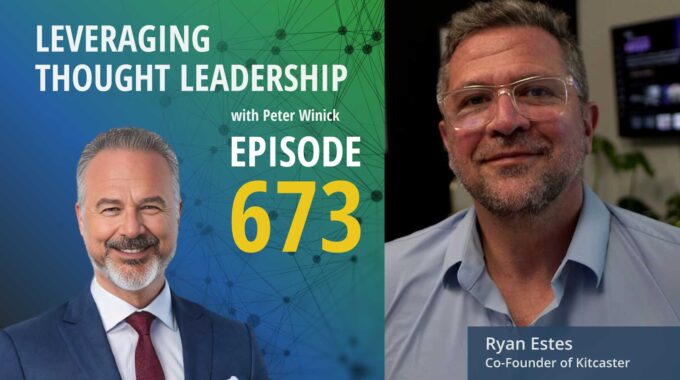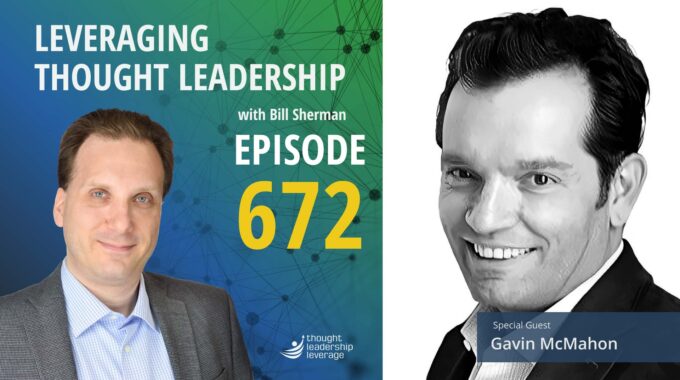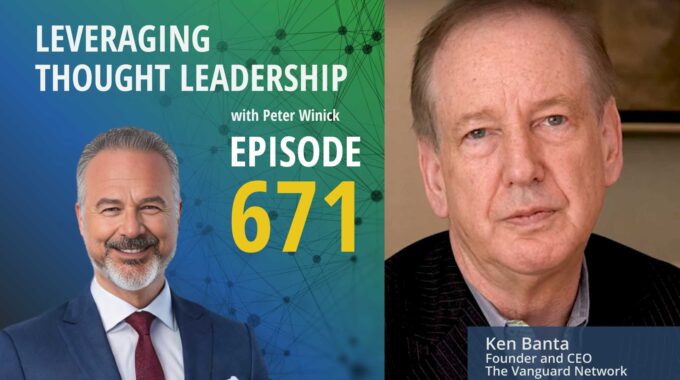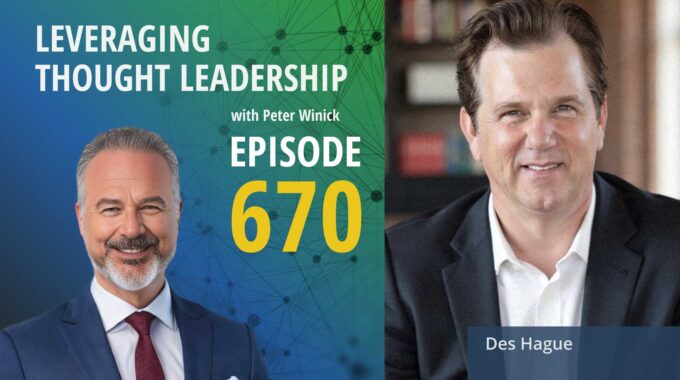Founder-led marketing, podcast strategy, and the art of authentic conversation What makes a podcast truly…
Leveraging Thought Leadership With Peter Winick – Episode 12 – Tanya Hall
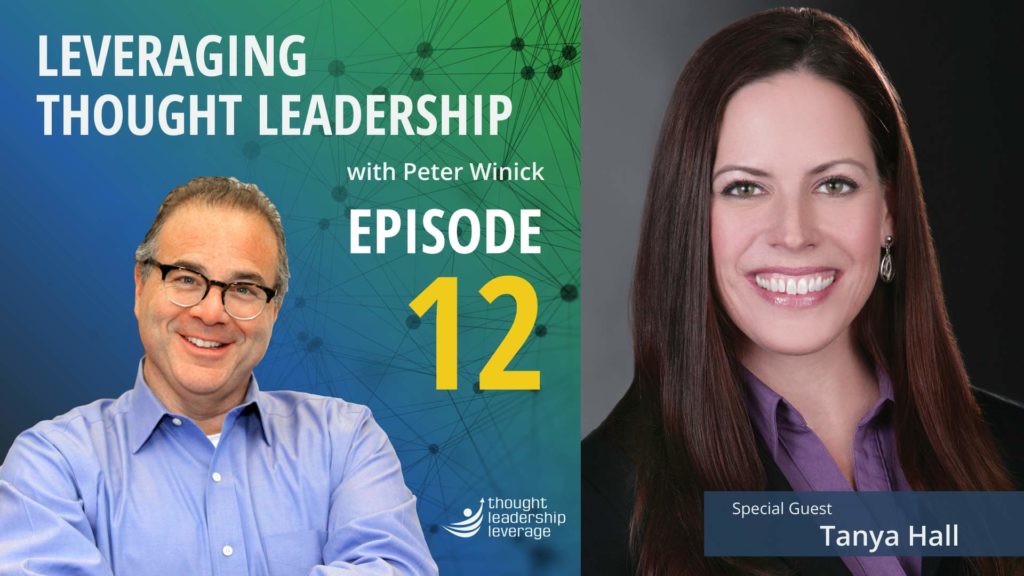
Publishing your first book (or even your tenth) is a tremendous accomplishment, but what you do afterwards can determine its success or failure. The modern publishing landscape is a tangle, and there’s a lot of hard work and hustle still ahead!
Our guest this week is Tanya Hall, CEO of hybrid book publisher Greenleaf Book Group. Before joining the publishing industry, she worked in digital media and in television production for Extra! and E! Cable Networks, and she’s here to give us a few insightful tips about publishing for thought leaders.
Peter and Tanya discuss the path from author to authority, and Tanya shares strategies that thought leaders need to manage a successful book campaign. Do you know how to manage content creation to support your book, or how to advertise and publicize your project for long term success? Listen in and find out more!
If you need a strategy to bring your thought leadership to market, Thought Leadership Leverage can assist you! Contact us for more information. In addition, we can help you implement marketing, research, and sales. Let us help you so you can devote yourself to what you do best.
Transcript
Peter Winick Welcome, welcome, welcome. This is Peter Winick with Leveraging Thought Leadership. I am the founder and CEO of Thought Leadership Leverage. And today I am really happy to have Tanya Hall, who is the CEO of Greenleaf Book. She’s a contributor to Ink. Greenleaf is a hybrid publisher and a creative agency specializing in creating bestselling books and compelling brands for thought leaders. So totally apropos. And I have known Tanya for a couple of years. I was actually made a visit into Austin a couple of months ago and had the privilege of spending some time with her and her team. So welcome today, Tanya. How are you?
Tanya Hall I’m great, Peter. Thank you for having me.
Peter Winick So here we are and our focus is on sort of the business side of content, which is where you and I both sit, really. So given your expertise on the publishing side, tell me just I don’t want to spend the whole day today on publishing, but if somebody is thinking about publishing and my experience is most people that are coming at it with their first book are somewhat misinformed. You know, there’s this fantasy of whatever New York publishers that will take your manuscript, pay you a lot of money, bring you fame and fortune, and all you have to do is put on a jacket with tweed, you know, elbows and a smoking pipe and life is good. Could you shatter their reality for them, please?
Tanya Hall Right. Yeah. I think the reality of it is one that has arisen out of a really upside down supply and demand situation and not just publishing, but all media where we have an oversupply of content and an under demand for that content. So that results in close to 3000 books being published every day. So there is no you publish it and they will come publishing a book regardless of which route you go. If that’s traditional, hybrid, self publishing or somewhere in between, it’s just it’s a lot of hustle. And I think that’s the piece that a lot of authors underestimate, and maybe rightfully so, because writing the book itself is no small feat, as I now know myself. But that’s just the beginning and really getting the word out, creating an audience and then being smart about how you use your content to develop alternate income streams and you’re not completely reliant on the vehicle. That is the book. That’s where the smart authors are going.
Peter Winick And I can recall I was politely asked to leave a meeting at McGraw-Hill several years ago when I was sitting there with a client, and they brought in the marketing ace that was, I don’t would say freshly out of diapers, but it wasn’t that long ago that that was out of diapers. And they came up with this marketing plan that was from like 1985. And I said, Can we bring the lawyers in because we need to upgrade the contract a bit so that my client knows that they have to sign a disclaimer that they are now responsible for all sales and marketing and success of the book. And we didn’t.
Tanya Hall Like that so much that.
Peter Winick They were there weren’t fans of that, but that’s the reality. So so on that note, you sit at an interesting sort of place where you’re seeing lots and lots of people that are smart, that are passionate, that are business savvy in their various businesses that move into sort of this thought leadership space. And obviously, a book is for many a necessary step in that process at some point. What are the cool things, interesting things, innovative things that you’re seeing people do to leverage and scale and get the message and get the content out to the audiences that they choose to get it out to.
Tanya Hall Well, I think a lot of it intersects sort of what you do in your world, Peter, and what I do in mine in terms of I we do them differently, which is lovely, but in terms of really being smart and strategic on the front end about how this content will be developed and used and for whom and in what format. And then there’s a whole timeline that gets applied against that because there’s a lot of work. So, for instance, a lot of the authors I work with, maybe they start as consultants and they’re working independently and helping people grow their business. Let’s say they’re leadership consultants. From there they realize, there’s some good money in speaking, and that also helps to build my visibility and my speaking. So they decide they want to move into that area and you almost have to have a book at that point to open the doors and to mentor you as a true thought leader. So they venture out and write the book, which is basically a mirror to us each. But that doesn’t always translate so well straight to paper. So if they’re being strategic on the front end, they’ll take a step back and look at their larger brand and decide, okay, the book suits part of my audience. But there’s this whole other part that needs online learning content and some level of coursework or maybe a certification program that keeps them engaged beyond my one off keynote presentation. So there are ways to be just more strategic and being able to think in long term about what the book is in terms of a foundational piece of the brand.
Peter Winick Know what book. But let me let me sort of unpack some of that. So it’s long term strategic. You know, writing a book is not a get rich quick activity. It’s knowing the audience. The other thing I picked up on what you said and then figuring out what else they want because you said, you know, if a book is just basically a very, very long speech, you know, it’s probably not going to be impactful. But I think you need to be thinking about here are the ideas that I have, my content, my thought leadership. And one place I can put it is in a book for 20, $25 and other places in a speech or whatever, you know, 10,000, 20,000, $30,000. But it’s that online learning, it’s that certification is the assessment. It’s all of those other things that really aren’t necessarily as sexy on the front end. But that’s really where the money is, and that’s really where you achieve scale and leverage because it’s, you know, you can get exposed to a lot of people during a speech. It’s one too many one, two, you know, 500 people. But you’re not going to have that ongoing sustainability and that that ongoing relationship that your content can have with folks post the speech.
Tanya Hall That’s absolutely correct. And I would argue that that’s even true to a degree to a large degree for the book launch, because it’s just the way that the retail market works, even if that is, let’s say, 50% of your book sales. It’s also related to the way that the media attention plays out in that the time around the launch period, you have this bell curve where the interest shoots up, your activity shoots up, people are engaged and talking about your book, and then they move on. And so sometimes authors get disappointed when they have this lovely push of sales around the launch and then it sort of fizzles out and they say, well, all that for nothing. That is it. That didn’t have anything in your back pocket there. Then you’re going to have to come up with a plan B, But ideally, you worked with Greenleaf or Peter and figured out something beyond the book so that you’re not scratching your head a year after your launch.
Peter Winick Well, the time to do that is before, right? The worst thing to hear is, you know, the book’s out. It’s 30, 60 days post launch and there’s all this sort of activity and then they’re like, geez, if only I, you know, dot, dot, dot. And it’s like, now is not the time to do that. You could it’s not going to be done well. The other thing I would comment on, based on what you said, is sort of the book industrial complex, if you will, often tends to treat a book as something that’s going to get stale. Right? It’s got a lifecycle of you do the launch in the spring or the fall and you get a season or so out of it. And I think it’s critical that as the thought leader, as the author, you realize that when you’re writing that book, you want to amortize that investment because it is an investment of your time, energy, money, resources, effort over at least a 3 to 5 year period, if not more. And you’re going to get that initial high coming out of the gate, followed by sort of what you touched on a little bit of postpartum depression, if the world doesn’t change 90 days later. But, you know, if the book is good, you know, you need to be thinking, wait, if this is for my target market and they got it, you know, launch plus a year launch plus a year and a half, does it really matter? The answer is no. It should be just as relevant to them at that point. I think that’s what saves authors from, you know, depression, if you will.
Tanya Hall Absolutely. And if I had a nickel for every email that an author forwarded to me from somebody, some stranger who read their book and it changed their life or encouraged them to do something or their business, you know, that’s incredibly rewarding even when I’m not on the receiving end. Just to know that you’re a part of that. That’s a really amazing thing.
Peter Winick So give me a couple of thoughts in terms of things that used to work really well that for whatever reason don’t anymore, so that you could basically be advising folks, don’t do this anymore of your, you know, your friend had a bestseller ten years ago you know and this worked for them. It doesn’t mean it’s going to work today because things are moving so quickly. Thunderclap and social media and all these different tools, it almost feels like you need to be on it daily to be top of your game.
Tanya Hall Yeah, that’s one of the challenges because obviously our thought leader authors are busy doing other things like consulting and running companies and they often complain, Well, how am I going to fit all this other stuff in? So that’s another conversation. But the first thing that came to mind is book tours. And it’s been a long time since book tours worked. And yet authors sort of come in with these fantasies of touring the country with lions, sneaking around the outside of the border. And as you and I know, it doesn’t happen.
Peter Winick So what happens all the time? I just have to be Michael Wolff, All right. Or all the time happens at least once every ten years, right?
Tanya Hall But yeah, you know, the likelihood of someone randomly walking into the bookstore and being exactly your target market is is quite slim. It’s just not a good use of resources. I have some authors who insist on doing it. It’s just on their bucket list. And if that’s where you are.
Peter Winick Well, it’s cool to do one if you know, if you’re an academic in your local community or if you want to do sort of the book launch party for friends and family, that’s cool. But don’t do 30 of those.
Tanya Hall Right. And even if you can tie it to an experiential event, if you’re teaching and it’s more of a seminar, but if you’re just sitting at a table with a stack of books that you’d like designed for people, that does not work. I don’t know that it ever did. And then I know that I know, Peter, you and I have talked about publicity to some degree in the past was it works in some ways, but it’s changed for sure. It used to be even though I’ve been in publishing for almost 15 years and then television before that, and it used to be that we would have an author go on one of the morning shows like Today Show or Good Morning America and mention their book a couple of times, and boom, we would sell 20,000 units because those shows, they were the tastemakers. And of course, as social media has come to the forefront and really kind of democratized that public’s decision making, that has changed. And now I have authors go on the Today show and talk about their book and nothing happens.
Peter Winick Well, it’s funny that you mentioned that, because not that long ago, maybe eight, ten years ago, you know, something like the Today Show would have an author 2 or 3 times a week. I don’t think it’s once or twice a month now. I mean, it’s just not there. And it used to be that could launch a career. I mean, that could launch a book to bestseller status for many years if it hit. Right. And there’s a lot of reasons behind it. But I think to me, I agree with exactly what you said there. But I think the cool part about that is, okay, so what do you do with it? Right? So the what you do with it is figure out that we’re living in the age of the long tail and go after the niches. Right. The more you know about your audience, the more you know about who your content serves best. Put the work in and put the effort in and find them because you can find them based on psychographic, demographic interest, or whatever the case may be.
Tanya Hall I agree. And in fact, it’s easier than ever to find them.
Peter Winick Exactly. So what? So book doors and that kind of thing aren’t working. Publicity. You got to be a bit skeptical of anything else. You would you would caution them. We’ll get to some positives because I want to leave everybody depressed today.
Tanya Hall Yeah, they don’t want people to be depressed. What’s not working? I think the other thing that people do that I caution against is this idea of sticking a toe in the water for your book launch. Like I’m going to try it out in my local market and then try a few things and then see how that goes. And then I’ll go big and again, because from my perspective, working in a publishing and distribution company that’s very focused on maximizing retail distribution. Again, as we touched on earlier, we’re very tied to some expectations around that launch date. So if it starts soft, that sends a certain message to the retail accounts to say, there’s no demand there, so we’re not going to widen distribution. In fact, we’ll probably narrow it. So that’s something that I have to counsel authors through from time to.
Peter Winick Time, all the time, quite frankly, to be doing I wouldn’t call it a soft launch, but testing R&D is when you’re writing the book, write, you know, write a blog, test it out. There’s plenty of opportunities to test the content. But I think what you’re saying is by the time it’s in book form, you’re committed, right? You’re not pregnant at that point. So dive into the pool, head first. Don’t tiptoe because it’s not going to do any good to sort of kind of sort of ish market it, you know?
Tanya Hall That’s right. Yeah.
Peter Winick Actually, let’s move to the positive. And we’ve hit on some of them. So out there right now we hope is listening a maybe they’ve written a book or two before or they’re going into their first rodeo. In terms of writing a book, what would you advise them to be doing before you know, they’re at the publishing stage? So it’s you know, they’ve got this good idea. They’ve been thinking about it probably speaking a little bit. They know it’s resonating, but they’re still shaping it. It’s maybe a year or two before they should write a book. What would you what would you be advising those type of people?
Tanya Hall I think the first thing and often the hardest one to convince people of is to really get clear on your brand, your message and who you serve. And there will be a few layers to that. So often that people are are very close to their expertise and of course, to their lifelong experience to the degree that they can’t step outside of what they do and see how others perceive it. And that makes it hard for them to market and understand an audience and really have an effective content strategy. So that’s the first piece. And I think just a fundamental part of any product launch. And I, I say that and people wince sometimes because they don’t want to think of their book as a product, but that’s exactly what it is. And we’re doing a national product when we launch a book. So let’s get down to business and treat it like a business, which means we’re going to get clear on our brand and have a strategy around that as the foundation for everything else. And that also helps to align anybody who comes alongside you to partner, whether that’s your social media team or the folks website. So it kind of becomes the DNA for the entire project and is well worth the time investment on the front end.
Peter Winick Yeah, and I think you’re right that some people get a little uncomfortable thinking about themselves on their platforms as a brand, and their book is a product. And the reality is it is. And you are right and you think about what great brands do and, you know, learn from that. You know, if you think about some of the great brands, whether it’s in retail or luxury or whatever, what is it about Starbucks? What is it about BMW? What is it about Rolex, whatever the case may be, that has made them great brand for a long, long time. And what can you learn from that and what could you apply to your platform? What else might you ask folks to think about?
Tanya Hall Well, I think the next big piece is this strategy that we’ve been talking about, which again, ideally is being formed alongside the creation of the book, if not before. So that we’re very clear on the content we will need to execute this long tail strategy. So if that’s going to include video work, for instance, or the online learning programing or a huge social media campaign and all of these things will differ depending on the author and their goals and the audience and also what they’re comfortable with. You know, some folks have no desire to be on camera, but they love doing podcasts or whatever works. There’s a way to play with that so that the author doesn’t completely burn out, but that that takes a lot of planning. And I think something else that people tend to kind of slap together on the way to the finish line of the manuscript. And then, you know, it’s not very thoughtful. Now, the strategy being very important and it’s heavy lifting. It’s hard work.
Peter Winick But one of the things I advise clients on to get your thoughts on this is start to look around, right? So I think what happens in this space, it’s weird, you know, my clients are smart. Your authors are smart people. These are not dumb people. Right. And they’ve got a level of business acumen and business savvy and business experience. But when they move into this space, they sort of leave that at the door, right? And they think, I’m putting on my author hat and my business logic hat can sort of rest a little bit. And what I say is, wait a minute. Hold on. Do a competitive analysis. Take a look at who else is out there that maybe they’re a competitor. It’s not a Coke and Pepsi World. So there’s room for more. Maybe you admire something that they’re doing. That’s cool. That’s creative, that’s unique. Maybe there’s something about their content that resonates with you or the way they bring it out there and start to, you know, learn and shape your own plan from that. Because what I have seen in a look to get your thoughts on this, I have yet to see an author, athlete or speaker get their totally alone. Right. Come out of the gate, write the greatest book ever and bang, you know, other dreams come true. They’re learning from others. They’re partnering with other speakers and authors and thought leaders. They’re collaborating. They’re helping one another get to the finish line. So can you touch on that for a moment?
Tanya Hall Yeah, I agree. You really need to immerse yourself into whatever that world is that that niche that you’re serving and differentiating is key. You touched on that in terms of understanding your competitors, how you may be different from them and how you’re alike. So you can also sort of pick up on what’s working for them, which also might work for you so that that homework is so critically important for them to and it ties into the brand that that’s a big piece of understanding who you serve and what your messaging entails. So yeah, I think that piece of it is, is again, super important and can make or break a successful launch.
Peter Winick And you’ve got to reciprocate and be generous and in return, right. And I think there is a real community of like minded authors and thought leaders and speakers that are constantly supporting one another.
Tanya Hall I definitely agree. Yeah, there’s the saying, you get what you give. And I think that’s definitely true in this world. And the people who are really in it for the purpose, the sense of purpose and giving back and serving. You know, you read about all the time, but some people walk that talk. Well, we’re to. But you pick it up pretty quickly and you realize maybe when you reach out to explore a partnership, that somebody might come right back to you and say, I don’t want to do this. How about this when others will blow you off completely. So you just orient yourself towards those folks who seem most willing to help because they’re the ones who authentically believe and are committed to that audience you’re serving and where you will also probably have strongest results.
Peter Winick And I’ve just been totally surprised in my years doing this, how incredibly generous some folks are and the connections and the collaborations and such that that people have made with what an another business or another industry would be a competitor, right? Accountants typically aren’t helping out other accountants as much. But in this space it’s it’s fairly common assuming your, you know, you’re not a jerk and you reciprocate and you know, you’re not always on the asking side of the equation. So that’s great. Tell us give folks a sense and our last couple of minutes here of who should be reaching out to you, how they reach out to you, and what is it about Greenleaf? And I’ve known Greenleaf for ten plus years. What is it that makes Greenleaf a little bit special, a little bit different. And who’s who is Greenleaf ideally suited for?
Tanya Hall Sure. So we are a publisher and distributor, and we’ve been in business for 20 plus years now, and we serve primarily nonfiction authors who tend to be thought leaders in their space, whether that’s business, health and wellness, self-help, parenting. We have a little smattering of fiction, I would say, but not very much. And the focus and in terms of our sales channels is definitely those places where nonfiction does very well, including airports, which are a huge strength for us. So the other thing that makes us special is that we are a hybrid publisher, as you mentioned at the top of the show. So we fit in between traditional and self-publishing to where our authors are investing in the production of their books. But in exchange for that, they are holding on to their rights, more ownership and control of the content and definitely a much higher piece of the royalties on the back end. So it requires somebody who’s very competent and also who understands the importance of ownership of rights in terms of being able to better monetize that content without loopholes, restrictions and breach of contract.
Peter Winick Yeah. And I’ve learned many of your authors that have worked with you that have been happy every step of the way, from the hand-holding to the production to the execution. And I think, you know, to your point, examining the business model and make sure it’s a smart one, some of the stuff I see from the big publishing houses today is, quite frankly, silly. They’re putting all the risk on the author in terms of not only you’re not getting an advance, but you’re ultimately funding for press runs and all those sort of things. And then if it’s a success, you know, you get $0.10 on the dollar. That doesn’t feel right and it doesn’t feel fair. And if you’re getting those sort of offers and deals, it doesn’t feel right. You know, it probably isn’t. So I would always suggest at a minimum, talking to Tonya and her team, how do we find you? How do we how do we get in touch with you? We just show up at your house late, late at night. Or what do we do there?
Tanya Hall You’ve got a cowboy’s welcome. We’re here in Austin, Texas, you know. Well, sure, but our website is Greenleaf book group.com and it is Greenleaf Book Group. Sometimes people confuse us with Greenleaf publishing which different company but Greenleaf book group.com and people are welcome to email me I don’t mind that at all. It’s Tanya Tanui a at Greenleaf book group.com and then on Twitter I am at Tanya Hall NYCHA LLC.
Peter Winick Well I want to thank you for joining us and sharing some of your wisdom. You can share it all because we only had a little bit of time here, but a lot of good stuff, a lot of things that I think people should be thinking about. You might want to listen to this again because there is a lot of it that came pretty quickly today from Tanya’s perspective and from mine as well. So thanks so much for joining us today and being a guest. Thank you.
Tanya Hall Thank you for having me. It was fun.
Peter Winick To learn more about Thought Leadership Leverage, please visit our website at Thought Leadership Leverage dot com. To reach me directly. Feel free to email me at Peter at Thought Leadership Leverage dot com. And please subscribe to Leveraging Thought Leadership on iTunes or your favorite podcast app to get your weekly episode automatically.


